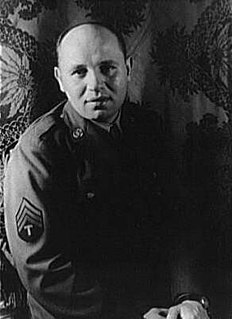A Quote by August Wilson
The director works as an interpretive artist, but he's still an artist, so you also have to give him room to create and to put his vision of the play or his translation or interpretation of the material on the stage.
Related Quotes
I think you have to accept that an artist also has a relationship with his or her art and his or her fans: you are in an open relationship whether you like it or not. Give the artist room to go into the place they create (literally or metaphorically) . And love them when they can't remember where they put their keys.
The artist of the future will live the ordinary life of a human being, earning his living by some kind of labour. He will strive to give the fruit of that supreme spiritual force which passes through him to the greatest number of people, because this conveying of the feelings that have been born in him to the greatest number of people is his joy and his reward. The artist of the future will not even understand how it is possible for an artist, whose joy consists in the widest dissemination of his works, to give these works only in exchange for a certain payment.
[The artist's aim is] not to instruct the viewer, but to give him information... . The artist would follow his predetermined premise to its conclusion, avoiding subjectivity. Chance, taste, or unconsciously remembered forms would play no part in the outcome. The serial artist does not attempt to produce a beautiful or mysterious object but functions merely as a clerk cataloguing the results of his premise.
The artist seeks contact with his intuitive sense of the gods, but in order to create his work, he cannot stay in this seductive and incorporeal realm. He must return to the material world in order to do his work. It's the artist's responsibility to balance mystical communication and the labor of creation.
Clearly the hardest thing for the working artist is to create his own conception and follow it, unafraid of the strictures it imposes, however rigid these may be... I see it as the clearest evidence of genius when an artist follows his conception, his idea, his principle, so unswervingly that he has this truth of his constantly in his control, never letting go of it even for the sake of his own enjoyment of his work.
That's the difference between the serious artist and the craftsman--the craftsman can take material and because of his abilities do a professional job of it. The serious artist, like Proust, is like an object caught by a wave and swept to shore. He's obsessed by his material; it's like a venom working in his blood and the art is the antidote.
That is what diminishes the artist and his song. The artist is now hermetically sealed. The publishing company got him his deal and they expect to profit from his songs. So what if he is a better singer than a songwriter; let's put him in a room with a real songwriter. Something great is bound to come...except very often nothing great comes out of such contrived match-ups. Nobody knows where a great song comes from, and that's why so many writers credit the Lord as a co-writer (though I notice they never offer Him half the writer's royalties) when they come up with a real gem.
I said earlier that I do not believe an artist's life throws much light upon his works. I do believe, however, that, more often than most people realize, his works may throw light upon his life. An artist with certain imaginative ideas in his head may then involve himself in relationships which are congenial to them.
My metaphor for acting in movies - not on stage because it's completely different on stage - is to put colors on an easel for the director to paint his own painting with in the editing room, long after I've left. You buy me for red and black, so I better give you really great red and black, but if I can give you purple, pink, green and brown too, I will.







































